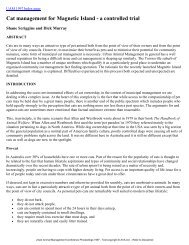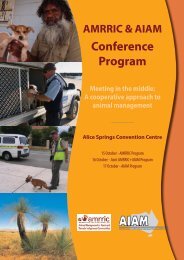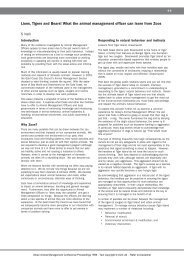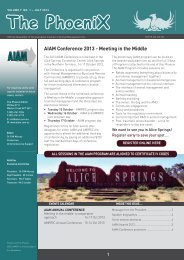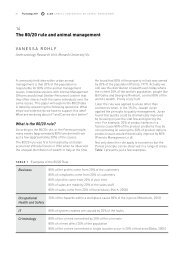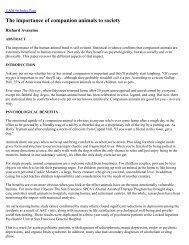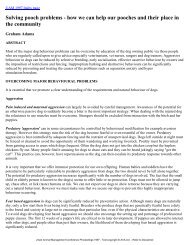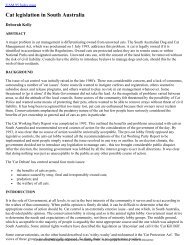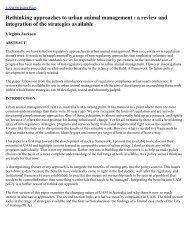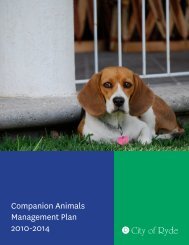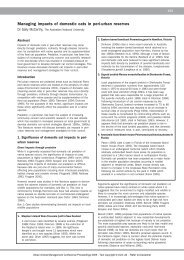Proceedings OF ThE - Australian Institute of Animal Management Inc
Proceedings OF ThE - Australian Institute of Animal Management Inc
Proceedings OF ThE - Australian Institute of Animal Management Inc
Create successful ePaper yourself
Turn your PDF publications into a flip-book with our unique Google optimized e-Paper software.
48 <strong>Proceedings</strong> 2012<br />
AIAM Annual Conference on <strong>Animal</strong> <strong>Management</strong><br />
08<br />
Aspects relating to pets, people and Indigenous communities<br />
and how to work together for a sustainable way forward<br />
Julia Hardaker<br />
CEO, AMRRIC (<strong>Animal</strong> <strong>Management</strong> in Rural and Remote Indigenous Communities)<br />
<strong>Animal</strong> management in Aboriginal and Torres<br />
Strait Islander communities is not just a remote<br />
issue. Seventy-six per cent <strong>of</strong> Aboriginal and Torres<br />
Strait Islander peoples live in non-remote areas,<br />
predominately along the Eastern Seaboard. Although<br />
there are a wide variety <strong>of</strong> situations, Aboriginal<br />
and Torres Strait Islander communities anywhere<br />
across Australia seem to face similar problems.<br />
Organisations and groups such as AMRRIC, RSPCA<br />
NSW and other service providers are well placed<br />
to learn from each other in meaningful ways to<br />
work alongside remote and urban Aboriginal and<br />
Torres Strait communities to deal with these, <strong>of</strong>ten<br />
complex, issues.<br />
Aboriginal and Torres Strait Islander peoples <strong>of</strong>ten<br />
suffer a sense <strong>of</strong> isolation from the people they<br />
interact with in remote or urbanised areas and<br />
<strong>of</strong>ten have a lack <strong>of</strong> access to services in remote<br />
areas. This can also be an issue in urban areas<br />
where people may be or feel economically or socially<br />
excluded, e.g. when people are ‘shame jobbed’ or<br />
embarrassed inadvertently or purposefully about<br />
the condition <strong>of</strong> their pets. A lack <strong>of</strong> resourcing<br />
for dog health/desexing programs and a lack<br />
<strong>of</strong> or insufficient Aboriginal and Torres Strait<br />
Islander employment both on the ground and in<br />
managerial positions is common. Lack <strong>of</strong> community<br />
engagement and empowerment due to lack <strong>of</strong><br />
appropriate community consultation with regards to<br />
by laws etc <strong>of</strong>ten results in ‘white fella’ top down law<br />
that is <strong>of</strong>ten difficult to comprehend, irrelevant or<br />
impossible to enforce.<br />
Understanding Aboriginal and Torres Strait<br />
Islander people’s different perspectives on family<br />
responsibilities and roles <strong>of</strong> dogs is crucial to<br />
delivering culturally sensitive programs in remote,<br />
rural and urban areas. Therefore collaboration with<br />
relevant support groups and appropriate information<br />
sharing to enable preparation for vet visits and dog<br />
health programs is also crucial. When delivering<br />
the program messages, the use <strong>of</strong> appropriate<br />
terminology and methodology becomes crucial.<br />
People need to receive messages delivered in a<br />
relevant and culturally appropriate manner such<br />
as posters etc that are not too text dominant with<br />
relevant pictures, otherwise immediate barriers<br />
can be formed. It is important program staff do<br />
not speak about removing peoples’ ‘neglected<br />
animals’ and finding them ‘new homes’ to avoid<br />
creating potentially painful parallels with the stolen<br />
generations story.<br />
Redressing these issues for pets, people and<br />
communities will provide a partnered and<br />
sustainable solution for our future. AMRRIC and<br />
RSPCANSW will endeavour to illustrate the above<br />
with achievements in terms <strong>of</strong> demonstrable and<br />
sustainable community benefit outcomes that are<br />
tangibly useful to Local Government.<br />
Background<br />
Seventy-six per cent <strong>of</strong> Aboriginal and Torres<br />
Strait Islander peoples live in non-remote areas,<br />
predominately along the Eastern Seaboard <strong>of</strong><br />
Australia. Problems with animal management,<br />
animal welfare and how to work alongside Aboriginal<br />
and Torres St peoples to improve these issues is<br />
challenging for remote areas as well as the urban<br />
areas. Opinions about pet ownership, treatment <strong>of</strong><br />
dogs that don’t appear to be owned, perceptions<br />
about people and their relationships to pets vary<br />
from community to community, state to state,<br />
individual to individual. Commonalities apply<br />
however there have been keys steps identified,<br />
through experience, that ensure positive ways<br />
forward.<br />
Cultural significance and traditional law relating<br />
to animals in communities cannot be overlooked<br />
when considering compliance, partnership and<br />
appropriateness <strong>of</strong> any animal health, welfare and<br />
control plans being developed with the community<br />
(Hardaker 2008). Recognition and acceptance <strong>of</strong><br />
these facts help facilitate the establishment <strong>of</strong><br />
sustainable culturally appropriate animal health and<br />
welfare delivered alongside education programs.<br />
Respecting the cultural traditions <strong>of</strong> individual<br />
Aboriginal and Torres Strait Islander communities<br />
and the right <strong>of</strong> the community to manage their<br />
animals and animal programs is imperative to<br />
undertaking any work in improving health and<br />
welfare outcomes. Dogs, in particular, remain



